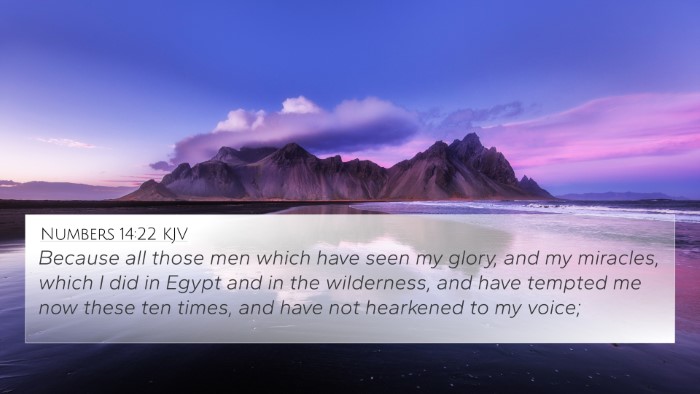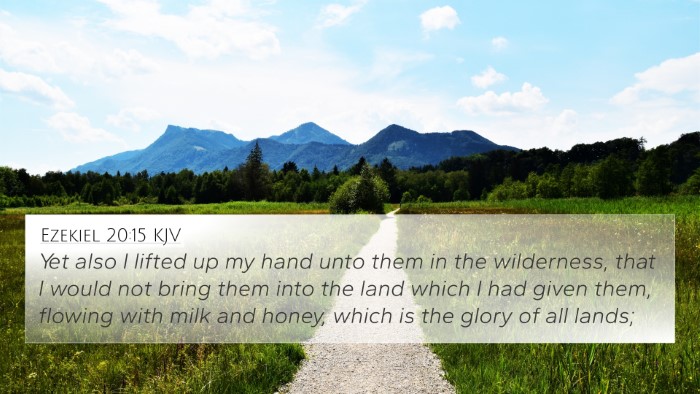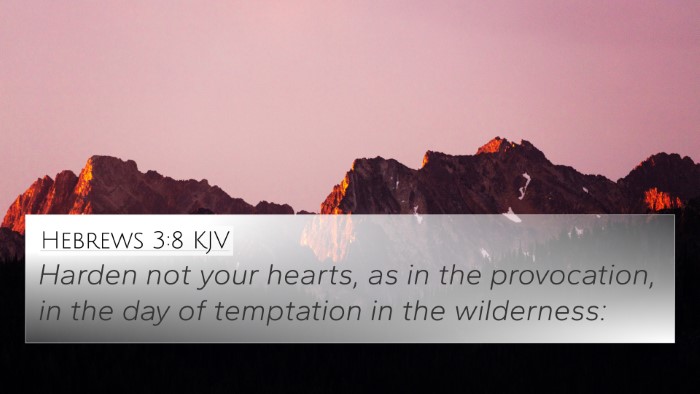Understanding Deuteronomy 1:34
Deuteronomy 1:34 states:
"And the Lord heard the voice of your words, and was wroth, and swore, saying,"
This verse captures a significant moment in the history of Israel as they prepare to enter the Promised Land. Several commentaries provide insight into the implications of this verse, highlighting God's response to the people's discontent and rebellion.
Verse Analysis
The verse emphasizes God's attentiveness to the cries and complaints of His people. It illustrates God's righteousness and the gravity of turning against His commands. The consequences of such rebellion reveal the seriousness of divine expectations.
Commentary Insights
-
Matthew Henry:
Matthew Henry emphasizes the significance of God's anger in response to the people's rebellion. He notes that God's swearing in judgment is an indication of the seriousness of the situation, highlighting that the Lord's attentiveness to the people reflects His desire for obedience. This anger is not capricious but is based on the people's direct disobedience.
-
Albert Barnes:
Albert Barnes elaborates on the phrase "the Lord heard." He accounts this hearing as God's providential care for His people, interpreting God's wrath as a response to the people's lack of faith and trust. This call for self-examination created a pivotal moment of accountability, setting the stage for subsequent events in Israel's history.
-
Adam Clarke:
Adam Clarke discusses the implications of God's words and actions. He points out that God's response serves as a solemn warning to future generations. Clarke emphasizes that the swearing of the Lord signifies a transformation in the covenant relationship, where disobedience leads to exclusion from the blessings of the Promised Land.
Cross References
This verse connects with various other passages that speak to the themes of rebellion, divine wrath, and accountability:
- Numbers 14:11-12: God expresses His frustration with the Israelites for their lack of faith.
- Psalm 95:10: A reflection on God's anger toward a disobedient generation.
- Hebrews 3:17: A New Testament warning against the sin of unbelief, echoing the sentiments found in Deuteronomy.
- Exodus 17:2-7: Details the Israelites' complaints against God during their journey, provoking His anger.
- Deuteronomy 9:8: Addresses the anger of God due to Israel's provocations.
- Deuteronomy 31:17: God warns of His hidden face due to disobedience.
- Isaiah 65:2: Illustrates God's outreach to a rebellious people despite their rejection.
Thematic Connections
Deuteronomy 1:34 serves as a poignant reminder of the importance of faith and obedience to God's word. It connects with a broader biblical narrative encompassing the consequences of disobedience.
Spiritual Applications
There are vital lessons in this verse regarding God's response to our behaviors:
- Understanding God’s desire for faithfulness leads to deeper relationships.
- Recognizing the impact of our words on our relationship with God.
- Appreciating the grace of God even amid His judgement invites repentance.
- Learning from Israel's example serves as both a warning and an encouragement to believers today.
Conclusion
Deuteronomy 1:34 underscores the weight of disobedience, revealing God's justice and love for His people. By exploring various commentaries and connecting with other scriptures, we gain a comprehensive understanding of God’s character and the expectations placed upon us as His followers.
Tools for Bible Cross-Referencing
For deeper study and exploration of connections between Bible verses, consider using:
- Comprehensive Bible Concordance for identifying themes and verses.
- The use of a Bible cross-reference guide can enhance your study.
- Engaging in cross-referencing Bible study methods helps uncover thematic links.
- Utilizing Bible reference resources ensures accurate connections between scriptures.
Further Study Suggestions
To expand your understanding of Deuteronomy 1:34, saavy students might explore:
- How to find cross-references in the Bible effectively.
- Identifying connections between Old and New Testament themes.
- Exploring similarities between prophetic declarations and New Testament teachings.








